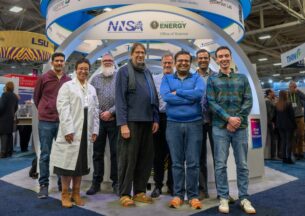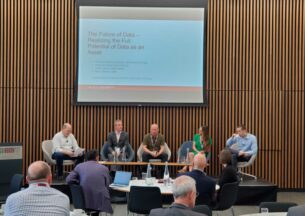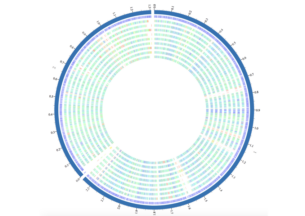Rick Stevens is Argonne’s Associate Laboratory Director for the Computing, Environment and Life Sciences (CELS) Directorate and an Argonne Distinguished Fellow. He is also a Professor of Computer Science at the University of Chicago. Stevens has been at Argonne since 1982.
In these and numerous other roles, Stevens is responsible for ongoing research in the computational and computer sciences from high-performance computing architecture to the development of tools and methods for bioinformatics, cancer, infectious disease, among others in science and engineering. Recently, he has focused on developing artificial intelligence (AI) methods for a variety of scientific and biomedical challenges, and has significant responsibility in delivering on the national initiative for exascale computing and developing the national initiative in AI.
Stevens is a member of the American Association for the Advancement of Science and has received many national honors for his research, including being named a Fellow of the Association of Computer Machinery (ACM) for his continuing contributions to high-performance computing.
Stevens is currently the PI of the Bacterial / Viral Bioinformatics Resource Center (BV-BRC) which is developing comparative analysis tools for infectious disease research and serves a large user community; the Innovative Methodologies and New Data for Predictive Oncology Model Evaluation (IMPROVE) project which is building a comprehensive framework and Exascale workflow to compare deep learning models that are aimed at solving critical problems; and the Low-dose Understanding, Cellular Insights, and Molecular Discoveries (LUCID) project for an integrated experimental, computational, and data-driven approach to determine the contributions of LD radiation to cancer by identifying and modeling the key molecular and cellular mechanisms involved, developing optimal strategies for interrogating these mechanisms experimentally, acquiring and integrating diverse datasets to formulate and test hypotheses, and validating predictive multiscale models of radiation risk.
Previously, Stevens has led and participated in a variety of other projects: constructing integrated databases of microbial pathogens (e.g., NMDPR); automating genome and metagenome annotation (e.g., RAST, MG-RAST) to develop a minimum genome derived from Bacillus subtilis; automating the construction of metabolic models for bacteria and archaea (e.g., ModelSEED); predicting drug targets for microbial pathogens and obtaining their protein structures; using experimental feedback for refinement of modelling and simulation analysis for biomedical research; and developing a massively parallel computational drug screening pipeline and novel algorithms for creating targeted virtual small molecule libraries that outperform existing databases. All of these projects have involved undergraduate and graduate students, many who are cross trained in computer science and biology and have gone on to varied careers in academia, industry, and the national laboratories, and have developed large-scale scientific codes that run on some of the world’s most powerful computers, as well as on clusters, clouds, and the ALCF’s AI Testbed.
Research
Focus Areas: Systems, Bioinformatics, High Performance Computing
Stevens’ research spans the computational and computer sciences from high-performance computing, to the building of innovative tools and techniques for biological science and infectious disease research as well approaches to advance deep learning to accelerate cancer research. He also specializes in high-performance computing, collaborative visualization technology, and grid computing. Currently, he is the PI of the Bacterial / Viral Bioinformatics Resource Center (BV-BRC) which is developing comparative analysis tools for infectious disease research and serves a large user community; the Exascale Deep Learning and Simulation Enabled Precision Medicine for Cancer project through the Exascale Computing Project (ECP), which focuses on building a scalable deep neural network application called the CANcer Distributed Learning Environment (CANDLE); the Predictive Modeling for Pre-Clinical Screening (Pilot 1) of the DOE-NCI Joint Design of Advanced Computing Solutions for Cancer (JDACS4C) project; and the Co-design of Advanced Artificial Intelligence (AI) Systems project focused on predicting behavior of complex systems using multimodal datasets.












